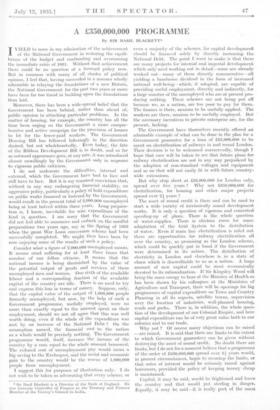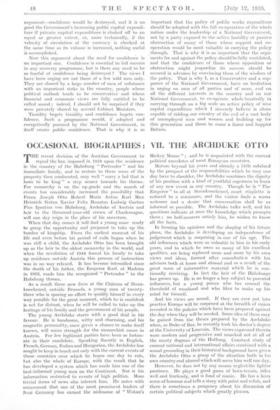A £350,000,000 PROGRAMME
By SIR BASIL BLACKETT*
YIELD to none in my admiration of the achievement of the National Government in restoring the equili- brium of the budget and confronting and overcoming the immediate crisis of 1931. Without that achievement there could be no question of a forward policy now. But in common with many of all shades of political opinion, I feel that, having succeeded in a manner wholly admirable in relaying the foundations' of a new Britain, the National Government for the past two years or more have been far too timid in building upon the foundations thus laid.
Moreover, there has been a wide-spread belief that the Government has been behind, rather than ahead of, public opinion in attacking particular problems. In the matter of housing, for example, the country has all the time been urging on the Government a more compre- hensive and active campaign for the provision of houses to let for the lower-paid workers. The Government Housing Bill has followed falteringly in the direction desired, but not 'wholeheartedly. Even today, the fate of the Ribbon Development Bill is in doubt, and so far as outward appearance goes, at any rate, it was introduced almost unwillingly by the Government only in response to vigorous public criticism. I do not underrate the difficulties, internal and external, which the Government have had to face and still have to face. But it is my 'reasoned conviction that, without in any way endangering financial stability, an aggressive policy, particularly a policy of bold expenditure on public works financed or fostered by the Government, would result in the present total of 2,000,000 unemployed being at least halved within three years. Long prepara- tion is, I know, inevitable for wise expenditure of the kind in question. I am sorry that the Government did not feel able to announce and embark on the needful preparations two years ago, say in the Spring of 1933 when the great War Loan conversion scheme had been successfully completed. We might then have been by now enjoying some of the results of such a policy.
Consider what a figure of 2,000,000 unemployed means. It means cruel suffering for at least three times that number of our fellow citizens. It means that the national income is being diminished by the value of the potential output of goods and services of these unemployed men and women. One sixth of the available labour and a corresponding fraction of the available capital of the country are idle. There is no need to try and express this loss in terms of money. Suppose, only, that the capital value of the output of 1,000,000 people formerly unemployed, but now, by the help of such a Government programme, usefully employed, were no more than exactly equal to the amount spent on their employment; should we not all agree that this was well worth doing, even if the whole of the expenditure was met by an increase of the National Debt ? On the assumption named, the financial cost to the nation as a whole would be precisely nothing. The Government programme would, itself, increase the income of the country by a sum equal to the whole amount borrowed. The reduced cost of unemployment pay would mean a big saving to the Exchequer, and the social and economic gain to the country would be the rescue of 1,000,000 people from unemployment.
I suggest this for purposes of illustration only. I do not wish to be taken as advocating that every scheme, or
* Sir Basil Blackett is a Director of the Bank of England. He was formerly Controller of Finance at the Treasury and Finance Member of the Viceroy's Council in India,
even a majority of the schemes, for capital development should be financed solely by directly increasing the National Debt. The point I want to make is that there are many projects for internal and imperial development which only need working out in detail—some are already worked out— many of them directly remunerative—all yielding a handsome dividend in the form of increased national well-being—which; if adopted, are capable of providing useful employment, directly and indirectly, for a large number of the unemployed who are at present pro- ducing nothing. These schemes are not being put off because we, as a nation, are too poor to pay for them. The finance is theie, anxious to be usefully applied. The workers are there, anxious to be usefully employed. But the necessary incentives to private enterprise arc, for the present, lacking.
The Government have themselves recently offered an admirable example of what can be done in the plan for a Government guarantee for a loan of £85,000,000 to be spent on electrification of railways in and round London. Their decision is to be welcomed unreservedly, though I hope that care will be taken to see that future plans for railway electrification are not in any way prejudiced by the adoption of non-standard voltages and equipment and so on that will not easily fit in with future country- wide extensions.
But why stop short at £85,000,000 for London only, spread over five years Why not £850,000,000 for electrification, for housing and other major projects spread over 24 years ?
The asset of sound credit is there and can be used to start a wide yariety of intrinsically sound development works. It is only a question of vigorous and concerted speeding-up of plans. There is the whole question of water-supplies. There is obvious room for some adaptation of the Grid System to the distribution of water. Even if main line electrification is ruled out there are opportunities for railway electrification all over the country, as promising as the London scheme, which could be quickly put in hand if the Government were determined in its action. The distribution of electricity in London and elsewhere is in a state of chaos which is discreditable to us as a nation. A large amount of new capital could be most economically devoted to its rationalization. If Sir Kingsley Wood will bring the same energy to bear at the Ministry of Health as has been shown by his colleagues at the Ministries of Agriculture and Transport, there will be openings for big programmes of capital expenditure on Town and Country Planning in all its aspects, satellite towns, supervision over the location of industries, well-planned housing, roads and parks. There is, in addition, the whole ques- tion of the development of our Colonial Empire, and here capital expenditure can be of very great value both to our colonies and to our trade.
Why not ? Of course many objections can be raised —are raised. It is said that there are limits to the extent to which Government guarantees can be given without destroying the asset of sound credit. No doubt there are limits, but I do not for a moment believe that a programme of the order of £850,000,000 spread over 24 years would, in present circumstances, begin to overstep the limits, or that rates of interest would be seriously raised against borrowers, provided the policy of keeping money cheap is maintained.
Capital, it may be said, would be frightened and leave the country and that would put sterling in danger; Equally, it may be said—it is really part of the same argument—confidence would be destroyed, and it is no good the Government's increasing public capital expendi- ture if private capital expenditure is choked off to an equal or greater extent, or, more technically, if the velocity of circulation of the currency is checked at the same time as its volume is increased, nothing useful is accomplished.
Now this argument about the need for confidence is an important one. Confidence is essential to full success in any recovery programme, but is there any need to be so fearful of confidence being destroyed ? The views I have been urging are not those of a few wild men only. They are shared by a large number of men of substance with an important stake in the country, people whose political outlook tends to be conservative and whose financial and economic views are fully entitled to be called sound ; indeed, I should not be surprised if they were privately shared by several Cabinet Ministers.
Timidity begets timidity and confidence begets con- fidence. Such a programme would, if adopted and energetically pursued by the National Government, in itself create public confidence. That is why it is so important that the policy of public works expenditure should be adopted with the full co-operation of the whole nation under the leadership of a National Government, not by a party exposed to the active hostility or passive obstruction of many of those whose support and co- operation would be most valuable in carrying the policy through. That is why it is so important that the argu- ments for and against the policy should be fully ventilated, and that the confidence of those whose opposition or obstruction might jeopardize its success should be secured in advance by convincing them of the wisdom of the policy. That is why I, as a Conservative and a sup- porter of the National Government, have no hesitation in urging on men of all parties and of none, and on all the different interests in the country and on our National Government, to co-operate whole-hearted]y in carrying through on a big scale an active policy of wise capital expenditure which I sincerely believe is alone capable of ridding our country of the evil of a vast body of unemployed men and women and building up for this generation and those to come a fairer and happier Britain.











































 Previous page
Previous page